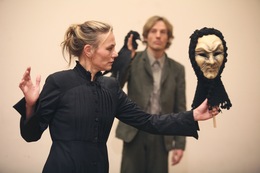De Moeder, de Vader en de Rest
"The Mother, the Father and the Rest" is a play for children of about 12 years old, to be played by two actors in classrooms. It is based on biographic data on the youth of a now about 60-years man, living in the north of The Netherlands.
The play is situated around an old-fashioned coalfired stove, in the back of the classroom somewhere up North in the ‘60’s. Associations of warmth, a family life, possibilities of warmth people can give to each other. Some scenes are located in the classroom, other scenes in a cowhouse, a factory and so on.
“De Moeder, de Vader en de Rest” is a story of not being wanted and of neglect.
Eric is born from a mother who told nobody she was pregnant. The boy is born in a cowhouse. When the farmer finds his housekeeper he doesnt kno whether the bucket with water she took with her, was meant to wash or to drown the baby.
The mother is sent to town. Her hobby is acting. She always takes Eric to rehearsals. When he is 7 years old, he plays Hansel in the Christmaspanto Hansel and Gretel. His mothers corrects him if he calls him mother, because she is playing the witch: I’m a stranger to you.
Eric tries to win the attention and love of a female teacher by buying her flowers, but she doesn’t see the signs of a neglected boy. Eric is becoming a nasty pupil, often punished.
Eric is very often alone at home. He makes up stories being a popular traindriver who is bringing everybody home savely. He imagines being a hero: a knight, or a detective, or a rich boy giving presents to everybody. Eric finds the key of the blanket factory his mother has started to work, and finds the money for the loans of several people.
His mother is suspected, being one of three persons having a key of the factory. She denies of course. Although there is no evidence, she punishes him when the police is gone, locking him up in a coal bunker, and beating him. She doesn’t she the boy wants her attention.
An actor and a actress are acting scenes from this life. Not a funny story, not a nice life. They discuss the possibilities of solving the problem of the boy. Is there no end to children being unhappy?


